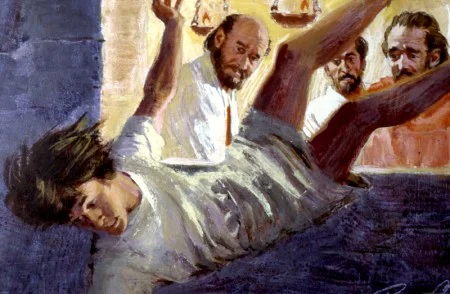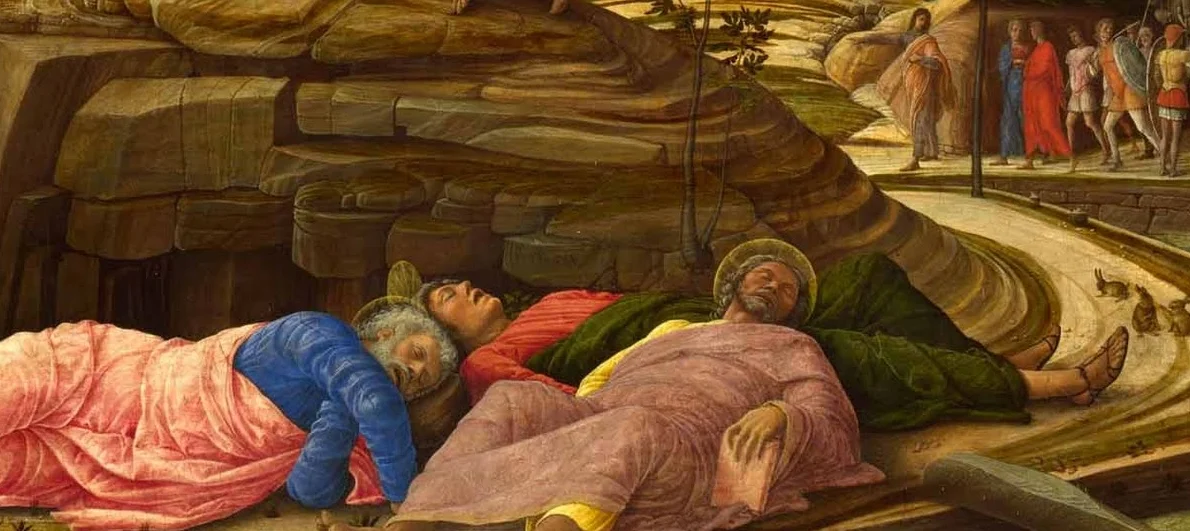Prologue: A Child in Church
I grew up in a denomination that celebrated Communion (aka the Eucharist) weekly. Before the actual breaking of bread (from a circular, unsliced loaf) and sharing of wine (from a single silver chalice) there was a lot silence wherein I tried not to fall asleep.
During this time, the men of the church would stand and deliver a prayer for the people, the church, local community, the country, and/or the world. And sometimes passive-aggressive statements, clearly directed at someone in the room. And sometimes the prayer felt like gossip, or Pharisaical-praise that the speaker was not like someone else. But mostly it was fine. Boring to a small child (and I have to assume most of the adults), but it was expected and accepted. Most weeks contained some "excitement."
There was one older gentleman who was never asked to preach during the regular service. So he used this time before Communion as his pulpit, always offering a mini-sermon presented in the guise of a prayer. I remember that he was clearly working his way through the book of Leviticus. However, whenever I would make this observation, my parents said it was not polite to draw direct attention to this fact. At least in public.
Obviously, I did everything in my power to avoid this time. Mostly unsuccessfully. When I was able to sneak out of the service, I would hide in the bathroom for as long as I could, attempt to silently play a solo game of foosball in the basement, or carefully head up the creaky stairs to the church library and read whatever looked interesting (apparently building the intellectual bench for these Card Talks decades before seminary). But I had to get out of those services, my current love of Leviticus notwithstanding. I needed to leave because staying and falling asleep was not an option. Death lay on the other side of that decision. And though my church believed in eternal security, there was a real possibility that my parents-- leaders in the church-- would take Deuteronomy 21:18–21 to heart and murder me. Falling asleep during church was one of the “unpardonable sins.”
So When the story of Eutychus was presented in Sunday school, I felt connected to the guy.
On Sermons, Sleep, and Cracked Skulls
On the first day of the week, when we met to break bread, Paul was holding a discussion with them; since he intended to leave the next day, he continued speaking until midnight. There were many lamps in the room upstairs where we were meeting.
A young man named Eutychus, who was sitting in the window, began to sink off into a deep sleep while Paul talked still longer.
Overcome by sleep, he fell to the ground three floors below and was picked up dead.
But Paul went down, and bending over him took him in his arms, and said, “Do not be alarmed, for his life is in him.” Then Paul went upstairs, and after he had broken bread and eaten, he continued to converse with them until dawn; then he left.
Meanwhile they had taken the boy away alive and were not a little comforted.
The Blame Game
Broadly speaking, there are two camps of interpretive thought on this passage. Two different types of sermons that get preached, and they both revolve around who should be blamed for this situation: Paul or Eutychus.
"The Blame Paul Sermon"
This sermon, usually attempting to be humorous, focuses on the fact that Paul was preaching for too damn long.
Paul is leaving the next day and they assembled observe the breaking of the bread together. In fact, some scholars note this as one of the first recorded examples of Communion being celebrated by the early Church. But there is one problem during this celebration: Paul couldn’t stop talking. He had soooooooooooo much to say. His words, his insights were soooooooooo important, everyone was held captive listening. So much so that that they had to light candles and lamps. So much so that he kept going until midnight.
And then Eutychus, heavy with sleep, fell out of third floor window to the hard ground below, and he died.
There is some debate about this point, but let's be clear: he was dead. Some make the argument that the fall would have been enough for Eutychus to be knocked out and/or concussed, but that he was not dead. But consider the following:
The Greek says that he was perceived as dead by those who got to him first.
The writer of Acts is Luke, a doctor. If he meant to say "he got a serious boo boo on his noggin," he would have communicated that. Instead he said "dead."
"Eutychus" is a Greek name that translates to mean "lucky" or "fortunate." Having Paul there to bring him back to life is more "lucky" than merely being concussed.
Vs 12 makes the point to say that the boy was alive, and employs a litotes when saying the people were “not a little comforted” (NRSV). A litotes is a figure of speech. It’s a form of understatement which uses a negative statement to ironically express a belief about something. Instead of making a direct statement about something, the opposite is said to not be true (c.f. Acts 19:24; 21:39). In other words, the people were VERY comforted and amazed by Paul's action. This reaction makes sense for an actual resurrection, not something that could be solved with bed-rest and a cold compress.
In short, Eutychus was dead. But he died because Paul couldn't shut up. And even after the traumatic turned miraculous event, Paul still didn't shut up. He keeps talking until dawn. And then he left.
The "Blame Paul" sermon can be a call for religious leaders to check themselves:
Yes, you do great work, but at what cost? Have you considered the actual needs of those around you, not just what you think they need?
Maybe you're making a mess of things you'll have to clean up later. Makie sure the gifts you want to use are actually needed in the situation.
Are you putting unfair stress on your laity and fellow clergy due to your actions.
and of course
Stop preaching for so long. No one can follow all of that, you're including too many arcane details that are over our heads, it seems like you just like to hear the sound of your own voice, the Sunday morning service is lacking in other areas because it is monopolized by your sermon. (etc)
The list goes on. And to be clear, this doesn't just have to be a list of gripes. There are legitimate concerns for church organization, governance, polity, and pastoral activities that can come out of this sermon. As well as a lot of humor.
"The Blame Eutychus Sermon"
This sermon, generally more serious, focuses on physical laxity as a sign of moral laxity. That Eutychus' situation is a metaphor for the dangers of not being alert to physical and spiritual dangers. This sermons is in part predicated on the information we have about Paul's life.
Eutychus had to know how important Paul's time was: Paul was running for his life from the authorities, and only had limited time to present Eutychus' community with holy words and instructions. And don't forget, we consider Paul's words to such communities so important we've codified a significant portion of them in the New Testament (as well as a bunch that weren't written by him, but we pretend they should still bare his name. We're looking at you Pastoral Epistles, among others).
With this in mind: Eutychus. Brother. You're getting divine revelations, wisdom from the horse's mouth as it were, and you can't stay awake for that? Seriously? What the Hell dude?
The “blame Eutychus” sermon often ties into the “stay awake” motif of the New Testament: that sleeping is in opposition to watchfulness, as in the case of the disciples in the garden of Gethsemane.
There is also then significance of the lights mentioned in verse 8: they represent the revelation/truth provided by Paul, which Eutychus was missing out of. And there is almost nothing worse in the Bible than denying/ignoring revelation. By this rationale, Eutychus got exactly what he deserved, and was "lucky" that Paul brought him back to life. Since the light/sermon was the most important thing, Paul continued preaching once the young man was back on his feet: nothing should stop the light of God from shining.
The "Blame Eutychus" sermon can be a call for followers to check themselves
It asks the question(s):
What is it you had to do that was so much more important than hearing and following the words of God?
What are those things you're prioritizing over the divine will?
Wonder how that lack of focus will pay off for you? Maybe you'll break your neck. Hope someone is there to put you back together again, spiritual humpty dumpty!"
Both/And Blame
But is there a middle ground? Is it possible for a both/and sermon sermon from this passage?
Yes, Eutychus fell asleep, which fits the biblical tropes and motif of spiritual inattentiveness, but damn it Paul, church leaders need to not place heavy burdens on their followers.
Remember, the author of this passage also wrote the following in Luke:
One of the lawyers answered him, “Teacher, when you say these things, you insult us too.” And he said, “Woe also to you lawyers! For you load people with burdens hard to bear, and you yourselves do not lift a finger to ease them. (Luke 11:45-46)
We're not saying Paul was as bad as the Pharisees... wait. Yes, we are. Paul WAS a Pharisee. So maybe old habits die hard. But here's the point: teachers are required to bring enlightenment to their students and followers, but that enlightenment needs to be presented in a way that can be absorbed. The message can be lost because of the messenger, as much as it can be lost because of the receiver (as shown in the Parable of the Sower).
Perhaps those of us who are followers need to ask what we "stay awake" for, what we attend to, what we feel is important in our lives?
Perhaps those of us who are leaders need to ask whether we are helping or hindering people from focusing on the important things in their lives?
Perhaps we can all do a better job of keeping our heads.
But what do we know: we made this game and you probably think we're going to Hell.


